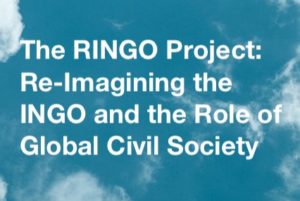The Funder Action Pod, convened by RINGO and Council on Foundations, aims to reimagine funder relationships with their traditional partners (INGOs) in a way that shifts power and resources to local actors. A key element of this process is for funders to find a new approach to accountability – one which strengthens community voice and the fabric of local and national civil society in particular. At the meeting of RINGO’s Funder Action Pod in late February 2024, a wide range of donors (from bi-laterals to foundations, to special and collective funds) came together to explore what reimagined accountability might look like for them and how it can play a part in shifting power.
Doing things differently
The session was shaped by presentations from Kate Moger (Director, Pledge for Change) and Jimm Chick Fomunjong (Head of Knowledge Management, West African Civil Society Institute) who are leading the work on the innovative Pledge Accountability and Learning Mechanism (PALM). The Pledge works with a dozen NGOs that are committed to changing their practices to build a stronger aid ecosystem, and the PALM is the embedding of accountability and learning into the initiative. We also invited Carolyne Ng’eny, the Programme Officer of Firelight Foundation, to share their work as a multi donor trust fund that supports movements, grass roots and community based organisations (CBOs) to drive systems change for children and young people in East and Southern Africa. The approach that Firelight Foundation has taken to centre CBOs in its accountability mechanisms and approaches was fantastic to hear about.
Barriers to change
New models of accountability were discussed with a spirit of openness and enthusiasm, along with a dose of realism. On the latter, virtually all of the funders present noted they face restrictions in the scope and speed of change due to their obligations to different stakeholders. It was noted that these constraints can be quite different for bi-lateral governmental donors and foundations. Governments must marshall the political will to make changes to accountability approaches, often needing support from constituencies (legislators, parliamentarians, voters etc) who may be development sceptics and motivated by colonial or great power ideas about “foreign aid”. Private philanthropy can be shaped by a founder and/or a Board of Directors. In most cases private philanthropy has less funding to move, and the constraints are less complex for foundations than for government donors.
A shift in practice
Even within the limitations, change is happening. A number of foundations are moving toward more participatory partner evaluations, including a shift in for whom and how impact is measured, and who is accountable to whom for results. Overall, efforts are being made so that accountability to the “end user” of development is placed at the centre. On a practical level, care must be taken that requests for feedback are not extractive, and that data and learning are actively shared with and helpful to communities and CBOs. The example shared by Firelight Foundation illustrated that challenging and flipping the traditional model demands significant time and resources.
Action Agenda
Moving forwards, here are a few areas for funders to be aware of and to navigate carefully:
- If funders are working with and through intermediary organisations, they need to be aware of the type of accountability practises these partners are using, and ensure that they are not repeating or entrenching extractive practices
- Funders also need to be conscious of and careful with the question of who is paying for evaluation work. Those who pay can then hold a level of power which, if not carefully managed, could impact on the accuracy and relevance of the work.
- Funders have a history of requiring metrics that serve other stakeholders and do not serve a community’s local objectives. These power dynamics need to be actively managed.
But, of course, communities and CBOs are heterogeneous – there is no single point of view and a community will have many stakeholders who will not agree on what are the best interventions and how to best measure impact. Funders, rather than rejecting or minimising these differences, can lead by building this variety into their accountability models and educating their own stakeholders. Understanding the nuance and embracing the messiness could be a critical step towards trust building with CBOs. This means recognising and mitigating barriers born from a colonial mindset and trusting that communities know what they need. The assets and resources, knowledge and social networks held in local communities need to be trusted and honoured, or new ideas of partnership and accountability will not flourish and bear fruit.
Photo by Susan Q Yin on Unsplash
